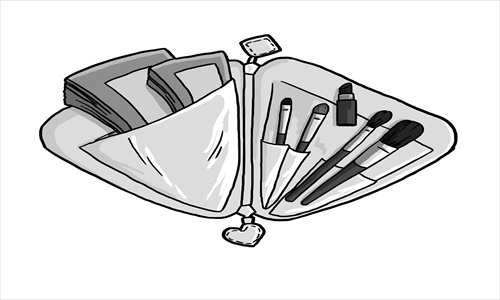Tanned or pale, beauty comes with sharp price all over the world

On The New York Times' front page on August 4, there were stories about the struggles in war-torn Syria, the latest grim job figures in the US, the resignation of a prominent official in the White House, and the future marketing opportunities for some Olympic gold medal winners. But the most emailed story that day was about an odd beach fashion among Chinese women in the coastal city of Qingdao.
The pictures accompanying the story were eye-catching. The bikini-clad women are wearing masks that expose only their eyes, nose and mouth to protect their skin from being tanned.
Even in a highly globalized world like ours, the tastes of the East and the West can sometimes be totally opposite.
I still vaguely remember the fervent admiration Chinese people pay to women with pale skin, and the painstaking ordeals women go through to make themselves look pale, from the parasols popping up on the street whenever the sun shines bright to the bottles of whitening lotions lined up on the tables of the girls' dorm in college.
I remember some darker skinned girls putting multi-layers of whitening lotion on their faces, making them look like victims of a sharp frost.
But this view can quickly be changed once you arrive in the US, where tanned skin tops the beauty spectrum. Indoor tanning is a $5 billion per year industry. A Chinese friend of mine once bemoaned her fair skin when we went to Coney Island beach. "It's half way through the summer and I still haven't got a tan. I feel so shameful," she said.
However different they are, Eastern and Western aesthetics have one thing in common: They both seem to be largely influenced by the social pyramids of their homelands. In China, rural people with hard lives usually have darker skin, thanks to their work in the fields.
A Chinese woman interviewed in the New York Times article attested to this by saying she doesn't want to be tanned for the fear that others will mistake her for a peasant. Such attitudes were once common in Europe, where noble women would slather their faces with lead-based makeup to get as pale as possible.
There are no peasants in the US. The farmers here have long been liberated from hard days in the sun by their advanced machines and enjoy a much better financial status. And tanned skin is associated more with a wealthy and healthy lifestyle.
After all, the tanning shops are not free, and a millionaire with a yacht and private beach is more likely to have tanned skin than a single mother rushing between two jobs in dimly-lit offices or stores.
It's worth noting that it is tanned skin, not natural black skin, that gets saluted by fashion fans here in the US, unsurprising for a country where blacks are still socio-economically disadvantaged. The Clark Doll Experiment, invented by famous sociologists Kenneth and Mamie Clark in the 1930s, and its various follow-ups, have never failed to show that black children generally think white dolls look nicer and prettier than black dolls.
Indeed, the preference for different skin colors may not be the only aesthetic aspect influenced by the social pyramid. The general public's opinions on whether it looks better to be skinny or voluptuous, wear long dresses or shorts, are largely led by the Hollywood stars and the cover girls on the high end magazines.
In other words, the rich and their friends often have the ultimate say on almost all fashion judgments.
This brings us to the recent controversy about some beauty competitions in China. Too often the winners look below average, and the audience blames the infiltration of dirty money into the competitions.
But what's scarier than the faces of some of the winners is that if this goes on, one day all of us may not be able to remember what our standards of beauty once were.
Until then, the mask wearing women on the beach still look more like aliens than models.
The author is a New York-based journalist. rong_xiaoqing@hotmail.com